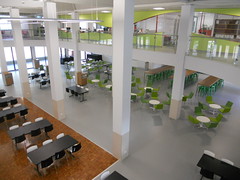 Every parent feels at least a little bit of concern when their “baby” is ready to start college. If your son or daughter has celiac disease, or an allergy or intolerance to gluten, then you may be especially concerned about if your child will be able to find enough food while at school. Fortunately, several colleges are starting to cater to students who need to eat a gluten-free diet.
Every parent feels at least a little bit of concern when their “baby” is ready to start college. If your son or daughter has celiac disease, or an allergy or intolerance to gluten, then you may be especially concerned about if your child will be able to find enough food while at school. Fortunately, several colleges are starting to cater to students who need to eat a gluten-free diet.
Celiac disease is an autoimmune disease. If a person who has celiac disease eats a food that contains wheat, rye, or barley, that person is going to get sick. The lining of their small intestine will become inflamed and damaged. They may also experience symptoms such as diarrhea, stomach upset, abdominal pain, and bloating.
People who are intolerant of, or allergic to, gluten also get sick when they eat foods like pasta, cereal, or bread. Celiac disease, and a sensitivity to gluten, are not exactly the same thing. However, people who are allergic to gluten, (or intolerant of it), will also become sick if they eat foods that contain it.
This can include some of the same symptoms as those who have celiac disease experience. Personally, when I accidentally eat something that contains gluten, I tend to get stomach cramps, and I also get incredibly exhausted. I have a friend who will vomit after eating gluten. No college student wants to experience those types of symptoms at school, (and especially not in front of their peers).
Some colleges and universities have started providing gluten-free options for their students. Not all colleges will do this, but it is becoming more popular. You might need to contact the school and specifically ask for information about what they are doing to help students who need to eat a gluten-free diet.
Some schools will label the foods in the cafeteria, to indicate which ones are safe for people who cannot tolerate gluten. Obviously, the accuracy of this will depend on how well educated the cafeteria staff are about what foods have gluten in them. Other schools have designated specific microwaves, stoves, and even entire cafeterias as a gluten-free zone, in order to prevent cross-contamination.
Your college student might be able to check the school’s website in order to learn what will be served in the cafeteria, and if it is safe for them to eat. There are some universities that have nutritionists on staff who are available to speak with students who need to eat gluten-free. The nutritionists can point out safe food options that the student might be unaware of.
Going to college is an important milestone in a young person’s life. No one should be prevented from having that experience simply because they happen to be unable to tolerate certain kinds of foods. It is nice that universities are starting to understand this simple fact, and are working towards making their cafeterias a safer place for gluten-intolerant students to use.
Image by Michael Coghlan on Flickr

